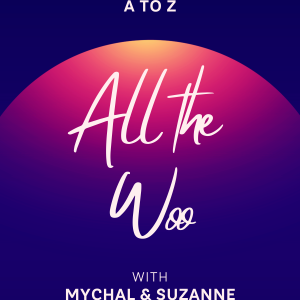All The Woo Podcast
Welcome to ALL THE WOO A to Z, a podcast inviting listeners on a weekly journey of intellectual exploration and personal growth within the realm of metaphysics. Whether you’re a seasoned philosopher or a curious mind, the discussions celebrate the profound questions of the universe while emphasizing the joys of friendship. Each episode fosters a theme of personal growth and a more nuanced perspective on life. We release on Thursdays!
Episodes

4 days ago
4 days ago
Suzanne and Mychal discuss what a labyrinth is and isn't, where you find them, and why they're woo!
Mentioned in this episode:
Egervin Egri Bikaver Bull’s Blood
Synonym Finder
Daedalus and the Labyrinth (and the Minotaur)
CLUE (movie and game)
LabyrinthLocator.org
The Writer's Journey -- Christoper Vogler
Please enjoy alcohol responsibly.

Thursday Jun 19, 2025
Thursday Jun 19, 2025
Suzanne and Mychal discuss Zen (and Zin), where they've felt it in their lives and how they've seen it in "action."
Mentioned in this episode:
Brown Estate Napa Zinfandel
Ziva meditation method
Please enjoy alcohol responsibly.

Thursday Jun 12, 2025
Thursday Jun 12, 2025
Suzanne and Mychal discuss what justice -- in the form of balance, Ma'at -- has been in their worldview. And why it's more of a teaching tool than payback.
Mentioned in this episode:
Becherovka liqueur
Chartreuse
Referred to: "Jesus Undefeated: Condemning the False Doctrine of Eternal Torment" and "Jesus Unforsaken: Substituting Divine Wrath with Unrelenting Love" by Keith Giles
Please enjoy alcohol responsibly.

Thursday Jun 05, 2025
Thursday Jun 05, 2025
Suzanne and Mychal discuss what initiations they've experienced and what initiation means to them.
Mentioned in this episode:
Schramsberg Blanc de blancs
Creme de Cassis
Chambord Liqueur
"Stepbrothers"
"Twins"
Please enjoy alcohol responsibly.

Thursday May 29, 2025
Thursday May 29, 2025
Suzanne and Mychal talk about the woo of A, E, I, O, and U.
Mentioned in this episode:
Eieio & Company Pinot Noir,
scalar waves
Om Mani Padme Hum
Aramaic Lord's Prayer
Sing the Body Electric -- Eileen McKusick and Brothers Koren
https://www.singthebodyelectric.com/
Gematria
The Metropolitan Museum of Art https://store.metmuseum.org/catalogsearch/result/?q=hieroglyphs+jewelry
(no longer hieroglyphs jewelry)
Egyptian goddesses: Nehkbet, Nut, Isis, Hathor
Please enjoy alcohol responsibly.

Thursday May 22, 2025
Thursday May 22, 2025
Suzanne and Mychal discuss Mychal's favorite topic: UFOs.
Mentioned in this episode:
Yuho "Eternal Embers" Junmai sake
"Mars Attacks!" 1996
"Ghostbusters" 1984
Occam's Razor = Simplest explanation is usually the best; what requires the fewest assumptions is usually correct
Doctor Who, Donna Noble
Please enjoy alcohol responsibly.

Thursday May 15, 2025
Thursday May 15, 2025
Suzanne and Mychal host their FIRST GUEST -- the amazing and beautiful cheirologist Kimberly McGaw. The episode is longer than usual, so pour and glass and get comfy! It also ends abruptly (Mercury retro?) and Suzanne says "wow" a record number of times.
Mentioned in this episode:
https://www.cheirologist.com/
House of Brown Red Blend Lodi, California
Enjoy alcohol responsibly.

Thursday May 08, 2025
Thursday May 08, 2025
Suzanne and Mychal discuss the woo-ness of a cuppa tea.
Mentioned in this episode:
Chateau Laribotte Sauterne
Yogi teas (Egyptian Licorice, fave!)
Please enjoy alcohol responsibly

Thursday May 01, 2025
Thursday May 01, 2025
Suzanne and Mychal discuss the traits and situations of soulmates.
Mentioned in this episode:
Chateau Carbonnieux, Pessac-Leognan
"Friends" theme by The Rembrandts
"Reflections in the Nile" book, 1997
Please enjoy alcohol responsibly.

Thursday Apr 24, 2025
Thursday Apr 24, 2025
Suzanne and Mychal discuss how omens aren't necessarily ominous!
Mentioned in this episode:
Beaujolais Nouveau
Pyramid (recent-ish) "discovery"
"Damien: Omen II" movie 1978
angel numbers
Baba Jolie, www.youtube.com/@babajolieguidedmessages8106
Please enjoy alcohol responsibly






